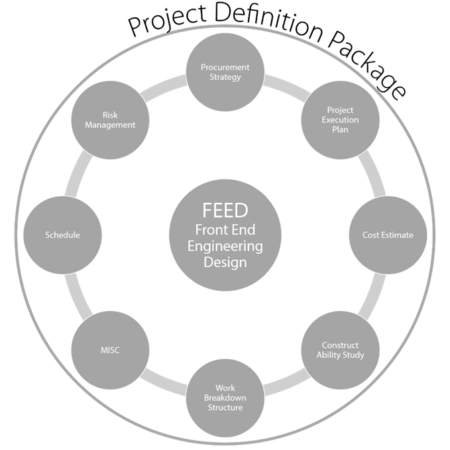Front End Engineering Design Study (FEED)
Here at Projex Solution’s, we believe a Front End Engineering Design study (FEED) is a key component for any successful project. A FEED study determines the projects scope, identifies risks, budget, and schedule; allowing a successful approach and position when arriving at the Execution Phase of a project.
This investigative phase validates technical documents, product specifications and clarifies the schedule of any project, answering those crucial questions that arise at the front end, allowing a cost effective and timely approach to any challenges or risks in those initial stages.
There are a variety of advantages to delivering a FEED study, such as:
- Reduced lifecycle costs
- Reduction of technical issues, schedule and costs associated.
- A more efficient plant/process start-up
- Mitigate any environmental, health and compliance risks.
- Improve risk identification & mitigation.
Reduced Lifecycle Costs
The FEED Study reduces lifecycle costs by developing a more efficient process by analysing existing processes and operations. Lifecycle costs are controlled by ensuring that quality equipment is used and by developing a thorough planned preventative maintenance programme providing longevity.
Reduction of Technical Issues, Schedule and Costs Associated
The FEED study reduces technical & financial issues by detailing out the design intent at the front end controlling how the project develops and providing stable, controlled platforms from the outset.
Output from the FEED study is to develop an executed project cost to an agreed accuracy of:
- Factored: +/- 50%
- Reduced FEED +/- 30%
- Detailed FEED +/- 10%
A More Efficient Plant/Process Start-Up
A FEED study improves a plant/process efficiency as it can analyse existing processes and operational procedures to find the most efficient and successful way to operate by incorporating new technologies, process operations & reliable maintenance regimes.
Mitigate Any Environmental, Health and Compliance Risks
A FEED study helps to mitigate any environmental, health and compliance risks as they are carefully analysed to determine the impacts of operations considered during the design phase of the project.
Improve Risk Identification and Mitigation
A FEED study improves risk identification & mitigation by reviewing the project using methods such as HAZID, basic HAZOP (from a P&ID), HAC (basic considerations). Here, we can develop the design to ensure all potential risks & operability issues fall within the relevant design criteria.


